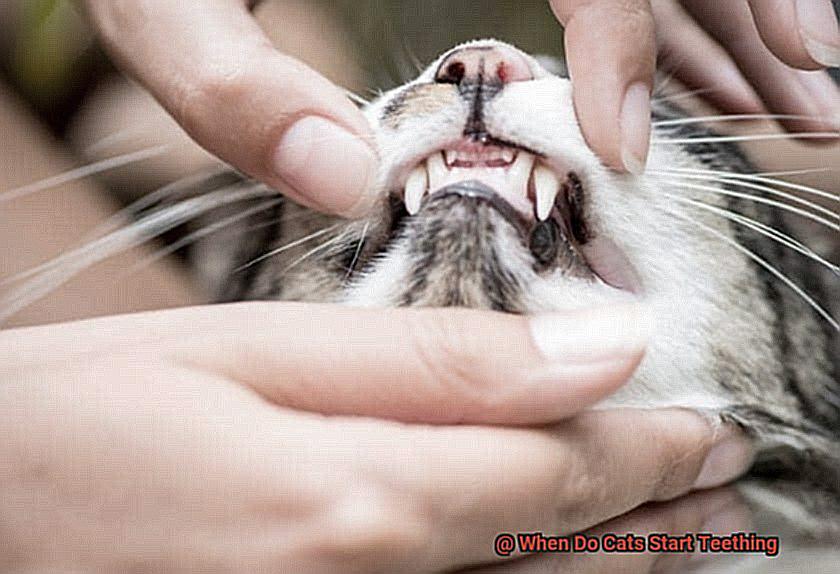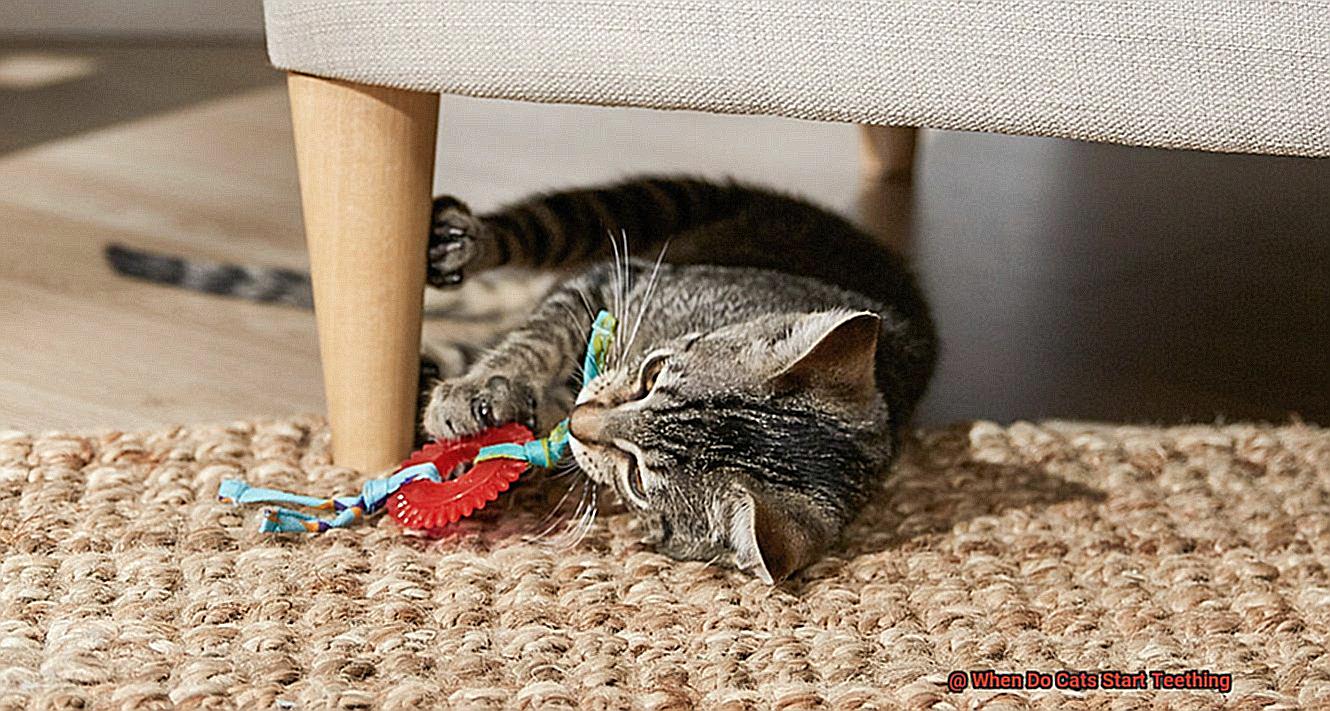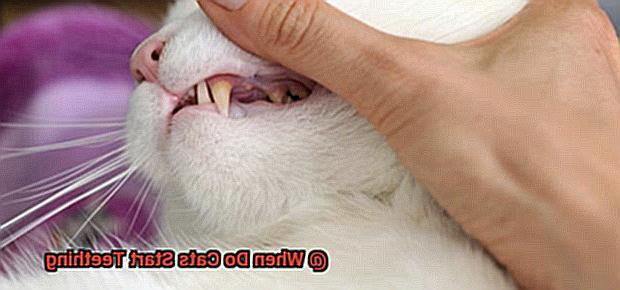Cats are truly fascinating creatures with a unique set of characteristics that make them a popular choice for pets.
They can be playful and mischievous one minute, and then independent and affectionate the next. As a new cat owner, you may be wondering when your little furball will start teething.
It’s an important stage for cats, and it’s imperative to understand when your kitten will start this process to ensure you are prepared for it. So, when do cats start teething?
The answer is not as straightforward as you might think. While the average age for cats to start teething is around three to four months, some may begin as early as two months or as late as six months.
Just like humans, every cat is different in their development. Teething is a natural part of a cat’s growth cycle, but it can be uncomfortable for your furry friend.
That’s why it’s essential to know the signs and symptoms of teething so that you can help soothe your kitten’s discomfort. In this post, we will dive deeper into the topic of when cats start teething.
We’ll explore what you need to know about caring for their new set of teeth and how to keep them healthy throughout their life. Whether you’re a first-time cat owner or a seasoned pro, understanding when your cat will start teething is crucial for maintaining their overall health and well-being.
So, let’s get started and find out more about this exciting and sometimes challenging part of owning a cat.
What is Teething in Cats?
Teething is a natural process that occurs in all mammals, including cats.
It typically starts when a kitten is around 3-4 months old and can last for several months. During this time, your cat may experience discomfort and pain in their mouth.
This can lead to excessive drooling, chewing on objects, and a decrease in appetite. To help ease their discomfort, providing them with appropriate chew toys and treats is crucial.
However, it’s not just about providing chew toys; it’s also important to monitor your cat’s oral health during teething and schedule regular check-ups with your veterinarian. Some cats may experience overcrowding or other dental issues that require intervention.
Starting a dental care routine early on in your cat’s life can help promote good oral health and prevent potential problems down the line. It’s important to remember that not all cats will experience teething in the same way.
If you notice excessive pain or discomfort during teething, don’t hesitate to consult with your veterinarian for additional advice and treatment options.
When Do Cats Start Teething?
Kittens are born without teeth, but their first set of teeth will start to emerge when they are around two to three weeks old.
These tiny, sharp, needle-like teeth are called deciduous or milk teeth, and they are the first step in your kitten’s journey towards their adult teeth. Around four months old, kittens start to lose their baby teeth as their adult teeth begin to erupt.

This can be an uncomfortable experience for your furry friend, causing them to chew on things more often than usual. But with appropriate chew toys and treats, you can help ease their discomfort and prevent them from damaging your belongings.

The entire teething process for cats usually takes around six months to a year. During this time, it’s crucial to keep an eye on your cat’s mouth and make sure their adult teeth are growing correctly.
Regular check-ups with your veterinarian are recommended to ensure that there are no signs of infection or other dental issues.
By providing your cat with appropriate chew toys and keeping an eye on their oral health during this time, you can help ensure that they have a healthy set of adult teeth and promote good oral health in the long run.

Signs of Teething in Cats
Similar to human babies, kittens experience the painful process of teething, which can make them feel uncomfortable and irritable.
However, with proper attention and care, you can help ease their discomfort and ensure they develop healthy adult teeth. Drooling is one of the most common signs of teething in cats.
You may notice more saliva than usual on their fur or bedding as they try to cope with the pain. Additionally, chewing on objects, such as furniture or toys, can provide relief for their sore gums.
Swollen gums are another telltale sign of teething in cats. Your cat’s gums may appear red and puffy around their new teeth, making eating and drinking an uncomfortable experience for them.
Bad breath is also common during teething, as bacteria and food particles can get trapped between the new teeth and gums. It is important to keep in mind that every cat’s teething experience is unique.
Some may not show any noticeable symptoms at all. However, if your cat displays discomfort or unusual behavior during this time, it is best to monitor them and even consult with a veterinarian if necessary.
Regular dental care practices like toothbrushing and professional cleanings can also prevent dental issues from arising during this time.
How to Help Your Cat Through the Teething Process
At around 3-6 months old, kittens will start to lose their baby teeth and grow their adult teeth. This process can cause discomfort, pain, and even behavioral changes. To make the process easier for both you and your cat, we have compiled 5 tips on how to help your cat through the teething process.
Offer Appropriate Chewing Toys
During the teething process, cats have an innate desire to chew. Therefore, providing appropriate chewing toys like hard rubber toys, dental chews, or even a frozen wet towel can help soothe their gums and alleviate discomfort. Avoid giving them human food or objects that could potentially harm them or damage their teeth.
Regular Brushing
Regular brushing is essential during the teething process to remove any food debris or plaque that may cause discomfort. Use a soft-bristled toothbrush and toothpaste specially formulated for cats to keep their teeth clean and healthy. Brushing their teeth regularly will also help them get used to the routine and make it easier for you in the long run.
Soften Their Food
If your cat is having trouble eating due to mouth pain, try softening their food by adding a little warm water or broth. This will make it easier for them to eat and provide much-needed comfort.
Keep Them Comfortable
Providing your cat with a comfortable place to rest during this time is important. Consider providing a warm blanket or pillow to ease any discomfort they may be feeling. Additionally, playtime and cuddles can help distract them from the discomfort they may be experiencing and provide comfort and reassurance.
Regular Vet Visits
Regular visits to the veterinarian can help ensure that your cat’s teeth are developing correctly and that there are no underlying dental issues. Your vet may recommend adding dental-specific products to their routine, such as dental chews or water additives, or may suggest a specialized diet for your cat’s dental health.
In conclusion, helping your cat through the teething process requires patience, understanding, and proper care. By following these tips and consulting with your veterinarian, you can ensure that your furry friend stays healthy and comfortable during this important developmental stage. Remember that providing appropriate care and attention during this time is crucial to prevent any further complications that may arise due to neglect.
Dental Care Routine for Cats
Part of that responsibility includes taking care of their dental health.
Starting a dental care routine for your cat early on is vital in maintaining good oral health and preventing dental problems in the future. Around 12 weeks of age, cats start teething, and this process can cause discomfort, pain, and behavioral changes.
To help your kitten through this process, providing appropriate chewing toys is essential. Soft rubber toys or special teething toys designed for kittens can help relieve discomfort and keep their teeth healthy at the same time.
Once your cat has all their adult teeth in place, it’s crucial to establish a regular dental care routine. Brushing your cat’s teeth regularly with a toothbrush and toothpaste designed specifically for cats is essential.
You may feel overwhelmed by the thought of brushing your cat’s teeth, but with patience and practice, it can become a stress-free experience for both you and your pet. Start by introducing the toothbrush and toothpaste gradually, allowing your cat to sniff and taste them before attempting to brush their teeth.
Regular dental checkups with your veterinarian are also an essential part of maintaining good oral health for cats. Your vet can identify any potential issues early on, such as tartar buildup or gum disease, allowing for prompt treatment and prevention of further damage to your cat’s teeth.
By providing appropriate toys during the teething phase and establishing a regular brushing routine, you can help keep your cat’s teeth healthy and strong for years to come.
ERku0zqNatE” >
Conclusion
In conclusion, knowing when your feline friend will start teething is essential for maintaining their overall health and well-being.
Although the average age for cats to begin teething is between three to four months, some may start as early as two months or as late as six months. Teething is a natural process that occurs in all mammals, including our beloved cats.
During this time, your furry friend may experience discomfort and pain in their mouth, leading to excessive drooling, chewing on objects, and a decrease in appetite. To ease your kitten’s discomfort during this stage, providing appropriate chew toys and treats can work wonders.
However, it’s important to keep an eye on their oral health by scheduling regular check-ups with your veterinarian to ensure there are no signs of infection or other dental issues. It’s worth noting that not all cats will experience teething in the same way – some may not show any noticeable symptoms at all.
Starting a dental care routine early on in your cat’s life can help promote good oral health and prevent potential problems down the line. By providing appropriate chew toys and keeping an eye on their oral health during this time, you can help ensure that they have a healthy set of adult teeth and promote good oral hygiene in the long run.
By following these tips and consulting with your veterinarian regularly, you can ensure that your furry friend stays healthy and comfortable during this important developmental stage.







